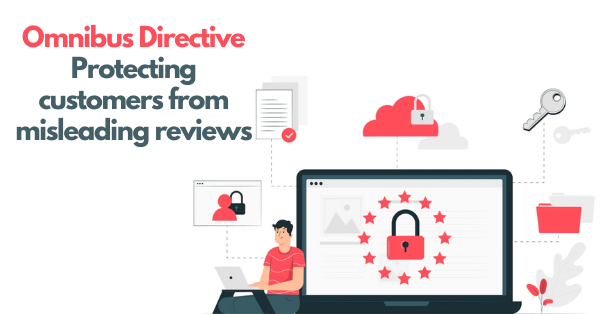With the increasing threats of data breaches, customers are more cautious with their personal data. At the same time, businesses are constantly trying to find new ways to gather and analyze customer data for business purposes.

Hence, the European Union (EU) has recognized this as a good moment to intervene and present the new Omnibus Directive to improve customer protection. This is especially prominent when it comes to customer reviews. Are they fake, or true ones? Since fake reviews can be very misleading, it’s clear why this segment needs more transparency.
At first glance, it seems that customers and businesses stand on the opposite side in a data battle. But, does it need to be like that, or there is a chance for these two elements to coexist?
What do you need to know about the Omnibus Directive?
Omnibus Directive (2019/2161) is a part of the "New Deal for Consumers" strategy that came into force in 2020 with the aim of increasing customer protection. It means that customer rights need to be protected when buying or using products/services online.
Businesses across the Union are expected to fully apply these measures from the 28th of May, 2022.
Omnibus Directive has 4 main elements:
- Council Directive 93/13/EEC (unfair contract terms) and
- Directives 98/6/EC (price indications)
- 2005/29/EC (unfair commercial practices)
- 2011/83/EU (consumer rights)
Why this legislation was adopted?
The European Commission released the results of a website screening on online reviews within the EU, and believe it or not, but 55% of screened websites are violating EU laws! The research included online shops, marketplaces, and booking websites, and half of them are evoking doubts about reviews' reliability.
Moreover, in the UK, 70% of respondents to a data privacy and security survey from the Department for Digital, Culture, Media, and Sport admitted that they’ve been a victim of some kind of a data breach. Since there are no major discrepancies in the numbers in other countries either, there is a good chance that you are also a part of this statistic whether as a business or as a consumer.
How is the Omnibus Directive affecting customer reviews?
Omnibus Directive has the aim to increase online customer protection and online reviews play a big role in that. Thus, if your business sells goods and services, this act also applies to you.
An important note is that Omnibus Directive is applicable to companies based outside of the EU if they are selling goods to EU customers. In other words, if your company is based in the US, UK, or any other non-EU country, you’re still obliged to follow these rules.
The Omnibus Directive is affecting a couple of business aspects, but for the purposes of this article, we’ll be focusing only on online reviews.

It’s not a secret that customers rely on reviews when shopping or booking online. That’s why is very important to create a trustworthy environment for everyone. The previously mentioned EU research shows that 118 out of 223 websites don’t explain who they prevent fake reviews. Also, 104 websites don’t offer any information about how the reviews are collected and checked.
Omnibus Directive forbids the submission of fake reviews and comments of any sort. Additionally, businesses will no longer be able to have a selective approach to reviews by publishing the positive ones and deleting the negative ones.
Moreover, businesses will take responsibility for the reviews’ authenticity. They must ensure that the feedback came from a real customer, and not from a bot, or the company itself.
Another important note refers to the sellers’ identity. Customers must be informed who the seller is - is it a registered company, or a person without their own business (non-trader).
What steps you should take?
First and foremost, you should review and update your processes for publishing reviews. Also, make sure to inform your customers about any possible changes.
Fake product reviews will no longer be permitted, so make sure that you’re not a part of any shady actions. The national authorities will be in charge of contacting the traders that are under suspicion to rectify their website. If it turns out that some unauthorized actions were taking place, they may have to pay a fine. So, make sure that you don’t find yourself among those companies.
There are websites that have huge popularity and their customers are not leaving reviews only there, but on social media, and third-party websites too. That means too many reviews that are impossible to track manually. You might find yourself in a situation where someone has left a fake review about your company (positive or negative) without your intervention.
So, how to keep track of all these reviews?
How JLA can help?
The best approach would be to hire an online review aggregator service that will be able to do this daunting task instead of you. One of such solutions is justLikeAPI (JLA).
JLA will help you stay aligned with the Omnibus Directive by keeping track of all reviews related to your business. Whether those reviews are posted on social media, review platforms, or your website, JLA is able to crawl even the most complex websites and collect all the reviews.
Currently, JLA is working with more than 45 platforms from all over the world, and new ones are being added on a daily basis.
For those who are interested to know more about this process, we’ve created a special Use case called Capturing customer reviews.
Make sure to check it out!
Conclusion
We highly encourage you to keep track of all the novelties in the eCommerce sector. As you can see, some of them can be very important. Even if you know that your business doesn’t have any fake reviews, you can only benefit from getting a better understanding of what’s being said about you online. Answering and analyzing customer reviews are a crucial part of your online review management and brand image in general.
What are your thoughts about the Omnibus Directive? Were you already familiar with it?
We would love to hear your thoughts about this topic.
